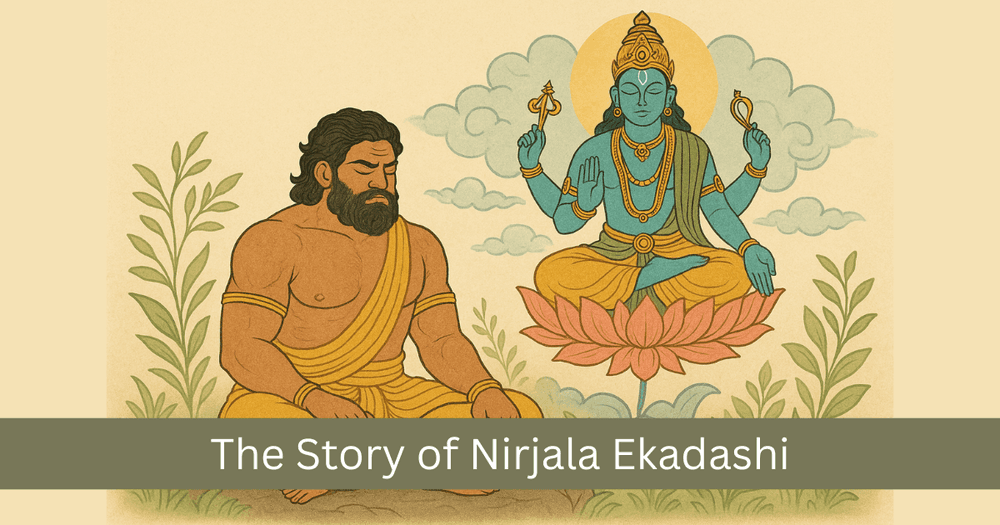Nirjala Ekadashi Story: When Bhimasena Conquered Hunger and Attained Liberation
By Aparna Patni
An inspiring tale of restraint, devotion and the path to self-realization

Table of Contents
There are moments in life when a person begins to recognise inner limits. This recognition often leads toward deep transformation. The story of Nirjala Ekadashi presents such a transformation. It describes the journey of Bhimasena who was known for immense strength yet faced his most powerful weakness when he decided to walk the path that leads toward liberation. The day of Nirjala Ekadashi still represents discipline, devotion and the quiet courage that turns human effort into spiritual strength.
The time of Nirjala Ekadashi and its main observances
Nirjala Ekadashi falls in the bright fortnight of the month of Jyeshtha. The vow begins at sunrise and completes at the next sunrise. The devotee refrains from food and also from water which makes this observance unique among all Ekadashis. The day is devoted to the remembrance of Vishnu and night awakening is also observed. The next morning the devotee offers gifts which complete the vow.
Main disciplines of Nirjala Ekadashi
| Observance | Description |
|---|---|
| Nature of fasting | Abstinence from food and water |
| Duration | Sunrise to next sunrise |
| Allowed action | Rinsing of the mouth |
| Worship | Remembrance of Vishnu and recitation of hymns |
| Offering | Water pot clothes umbrella and sweets |
| Merit | Equal to all Ekadashis of the year |
The importance of Ekadashi explained by Sage Vyasa
Sage Vedavyasa once instructed the Pandavas that observing Ekadashi brings purity of mind and guides a person toward liberation. Kunti Yudhishthira, Arjuna Nakula and Sahadeva accepted this vow with devotion. For them it was not only a ritual but also a method to bring balance and clarity in life.
Bhimasena however lived with a deep concern. He knew that the fire within him did not let him tolerate hunger. His nature made it difficult to follow every Ekadashi. He approached Sage Vyasa and sought a solution.
Panchang: The Foundation of Vedic Astrology and Its Role in Life
Why the question of Bhimasena was meaningful
Bhimasena did not wish to move away from devotion yet he knew his limitations. His question expressed the human desire to walk on the spiritual path without denying personal nature. Many people experience the same struggle. The desire to progress and the limitations of the body often stand together. Bhimasena’s question represents that struggle in a very relatable way.
Why Sage Vyasa recommended Nirjala Ekadashi
Sage Vyasa explained that if Bhimasena could not observe all Ekadashis then Nirjala Ekadashi would grant him the merit of the entire year. The vow is difficult because the devotee gives up water. Yet the difficulty becomes a doorway to inner strength. When a seeker accepts a path with clarity the divine grace gives support.
The intense resolve of Bhimasena and its significance
Bhimasena decided that he would follow the vow and rise above his limitation. On the day of the observance he did not eat and did not drink water. He spent the day in remembrance of Vishnu and passed the night awake. The next morning he offered a pot filled with water clothes umbrella and sweets to learned priests. After the offering he received the sacred food.
The merit and spiritual effect of Nirjala Ekadashi
Sage Vyasa blessed him and said that his vow would uplift one hundred ancestors and one hundred future generations. This reveals that the discipline of a seeker becomes a blessing for the lineage. For this reason the vow is also known as Bhimaseni Ekadashi and Pandava Ekadashi.
The spiritual message of the vow
This observance teaches that discipline is not meant only for those who are weak. Even the strongest can benefit from restraint. Nirjala Ekadashi shows that a person can rise above habits and desires. When the mind becomes steady life gains clarity and the seeker moves toward devotion.
Teachings of Nirjala Ekadashi
| Teaching | Explanation |
|---|---|
| Importance of restraint | Stability and purity of mind |
| Effect of austerity | Spiritual fire strengthens the soul |
| Nature of devotion | Remembrance of the divine brings peace |
| Inner strength | A person can overcome weakness |
| Blessing for lineage | Merit uplifts ancestors and descendants |
The truth of human life revealed through the devotion of Bhimasena
The story of Bhimasena reveals that spiritual journeys are not limited to sages. Every person walks through desires, limitations and inner battles. Nirjala Ekadashi becomes a symbol of this journey. It purifies the mind, strengthens the soul and lights the path that slowly leads toward liberation.
FAQ
1.Why is Nirjala Ekadashi considered difficult
Because the devotee refrains from food and water and remains disciplined throughout the day.
2.Why is it called Bhimaseni Ekadashi
Bhimasena received the merit of all Ekadashis by observing this single vow.
3.What offerings are given on this day
A pot filled with water, clothes, an umbrella and sweets are offered.
4.Can Nirjala Ekadashi replace other Ekadashis of the year
Tradition describes it as equivalent to observing all Ekadashis.
5.What is the spiritual purpose of the vow
To discipline the mind, control the senses and deepen the feeling of devotion.
Get your accurate Kundali
Generate KundaliDid you like it?
Author
Aparna Patni (40)
Experience: 15
Consults About: Family Matters, Muhurat
Clients In: MP, DL
Share this article with friends and family




